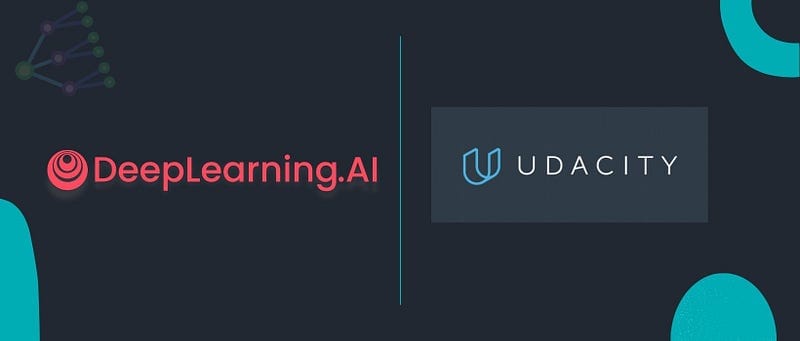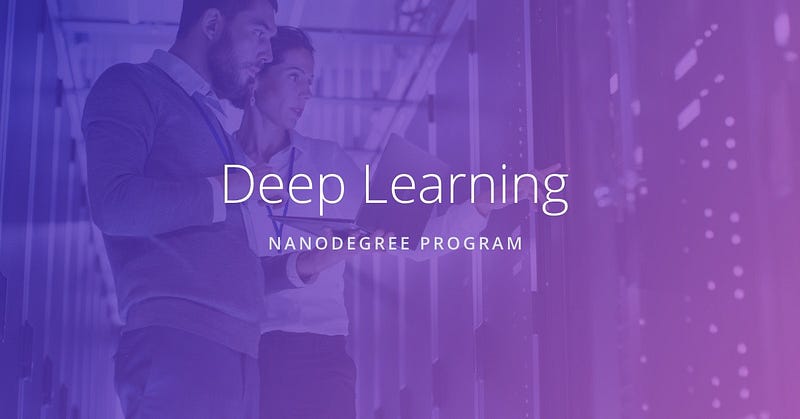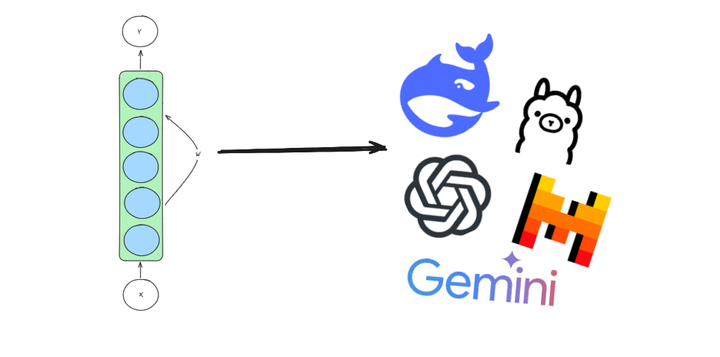Deep Learning Nanodegree and Deep Learning Specialization | Which course Should You Choose?
When you get to know the vast amount of applications of DL, you might feel excited to enter this field and contribute your ideas. But then…

When you get to know the vast amount of applications of DL, you might feel excited to enter this field and contribute your ideas. But then comes the primary problem, ‘Where to begin?’ The major sources that help beginners tremendously are
- Deep Learning Specialization, DeepLearning.ai, Coursera
- Practical Deep Learning for Coders, fast.ai
- Deep Learning A-Z: Hands-on Artificial Neural Networks
- Deep Learning Nanodegree, Udacity
I have invested much time in Deep Learning Specialization and Deep Learning Nanodegree. These two courses are entertaining and enjoyable, and I want to share my views on them to help others just entering the field.
Deep Learning Specialization, DeepLearning.ai

If you have previously taken some ML courses or have joined some ML groups, you should have already come across the name Andrew Ng.
Andrew Ng is one of the world’s most famous and influential computer scientists. His Deep Learning Specialization courses are a good starting point for ML/DL journey. The first two courses cover the foundations of Deep Learning, and the last two cover variants of DL like CNN, RNN, LSTM, etc. This specialization covers state-of-the-art models and some of the recent breakthroughs like transformers. You get to know the mathematical intuition between actual models currently used in the industry.
Now let us look at the pros and cons that I find in this specialization.
Let us get into detail,
The Pros:
- Suitable for both beginners and experts.
You can be someone with no touch of ML, or you can have solid ML foundations. This course helps you no matter who you are. Andrew Ng’s ability to teach any complex topic in simple words is unmatched.
The first two courses cover the foundations of Deep Learning, and the last two courses cover the variants of DL like CNN, RNN, LSTM, etc. Meanwhile, you have a devoted course that helps you learn some of the practical challenges you face in your ML models and Diagnose the model errors.
- Up-to-date
This course covers state-of-the-art models and some of the recent breakthroughs like transformers. You get to know the mathematical intuition between actual models currently used in the industry.
- The Financial aid.
No matter, what anyone says, the significant challenge that a student faces before taking a course is its price. Fortunately, like all the Coursera courses, you get to apply for financial aid for the courses and learn them for free.
The Cons:
- Lack of implementation of the models.
Not too implementation-oriented. You have to learn and code yourself. The projects help to some extent, but it’s mostly left to the students. You need to understand the application using Deep Learning frameworks by yourself.
Even in the projects, too much helper code is given, which changes the projects into “fill in the blanks”.
- No discussion about Deploying the model or GANs.
I feel that this is a con when you try to nitpick the details, but this specialization would have been unparalleled if it also contained tips to deploy a model or even some content about GANs.
- No special career services
The course doesn’t provide any career services, unlike the Udacity Nanodegree. But, since most of the people, who go to Coursera, are those who want to learn the concepts, this point can be ignored. Except for the credly certification, that might be somewhat useful if you are a freelancer.
Deep Learning Nanodegree, Udacity

Udacity Nanodegrees are known for their value and difficulty. A nanodegree is like a college semester where everything is provided for a fixed charge and a fixed amount of time. The significant difficulty of these nanodegrees is their respective time constraint. You need to complete all their modules before your term ends. If you couldn’t finish them, then that’s it. You either need to give up, or you need to pay more.
This Nanodegree is focused more on the coding part of Deep Learning rather than the theory. By the end of this nanodegree, you will be proficient in PyTorch and, optionally, would also be able to code in the TensorFlow framework. This program is for people with minimal knowledge or experience with Deep Learning. Udacity Nanodegree is self-paced and depends on the student’s curiosity and ability to utilize its services.
Now, let us look at the pros and cons I found during this nanodegree.
Let us get into the details,
The Pros :
- The structured, digestible course content.
The course content is simple and small. Each module is divided into lessons which are further divided into granular topics, and you find quizzes for some steps which are essential.
- Being Code-heavy
Unlike the Deep Learning specialization, this nanodegree is focused more on the coding part of DL rather than the theory. By the end of this course, you will be proficient in PyTorch, and you can also learn more about TensorFlow through its additional content.
For the students who don’t have powerful PCs, the nanodegree provides GPU powered workspaces to work on their models.
- The Feedback.
For each module, you get to complete a project, where you would need to code the model and train it in PyTorch. When you submit the model, you get feedback from a mentor, which can help you find better ways to code.
This is a valuable part of the nanodegree as the feedback is so granular that the mentors even refer to articles and StackOverflow discussions related to the changes in the code.
- External Links.
If you want to dig deep into a topic and learn more related concepts, you are provided links to helpful articles on medium, distill, and research papers on the topics. This helps a lot in improving your understanding of the topic that you are interested in.
- Light on Math.
The entirety of the nanodegree is light on math but focused on intuition regarding the topics. You are given the math only when the course can’t be progressed without math. This is a good thing for most beginners, but it also has a disadvantage, discussed in the cons.
- The Career Services
Udacity Nanodegrees are known for the career services that they offer. You get personalized feedback on your LinkedIn and GitHub profiles and get tips to improve them so that you could have a higher chance of getting some jobs or internships.
Cons that I found:
- Light on Math.
Despite being light on math, there are some areas where you get disappointed because of it, as you get no low-level explanation. I faced this issue the most when the course discussed LSTMs.
You get intuition enough to add the line of code to your model, but you feel dissatisfied with some sections because of their lack of depth.
- Lack of depth
Compared to Deep Learning Specialization, the content offered in this nanodegree is shallow at best. You get to apply some fantastic models, but ultimately you lose a lot of stuff like the ResNets, Transformers, YOLO algorithms and some applications like object detection, Face Recognition. This means that even after the nanodegree, you need to spend even more time reading articles or research papers. But, you need to do that even if these were taught in the course.
- Curiosity Dependent
The entire nanodegree is self-paced and depends on the student’s curiosity and ability to utilize their services. For example, in the discussion of LSTMs, you are redirected to multiple articles and lectures if you need a deeper understanding. The alternatives to LSTMs like GRUs, are entirely left to the student to learn.
- Devoted to AWS (especially in deployment)
This con is more specific to the deployment module. The entire module is devoted to teaching students how to operate the AWS Sagemaker service. There is no discussion about the other cloud computing services. If you are more theory-oriented, then this module is of less help to you.
- The price
Honestly speaking, I feel that this nanodegree is overpriced for the content it delivers. But, if you are motivated by career advancement, then this price might be somewhat justified because of the career services offered.
Conclusions
Based on everything, I believe the decision can be boiled down to a single question.
Which is more important: theory or coding?
The answer to the question depends on the individual. Some might feel that the theory is essential. Some might think that gaining practical coding experience is important.
However, I recommend the Deep Learning specialization if you want to concentrate on theory and gain intuition on the modern applications of Deep Learning by compromising with the coding part.
I propose pursuing a Deep Learning nanodegree if you want to acquire more expertise in developing DL models and make use of various employment services (if you can pay for it).


